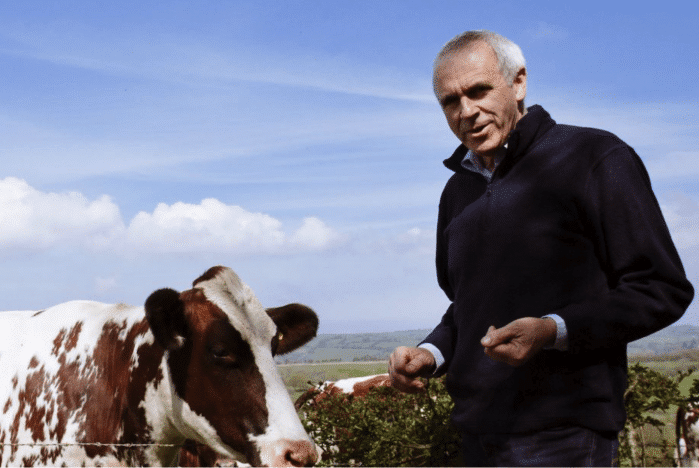Eating more red meat, not less – so long as it comes from sustainable grassland systems – could help in the fight against climate change, says Patrick Holden, founder of the Sustainable Food Trust.
The comment came during an interview on the BBC’s Today show this week with Holden and Vicky Hird of the Eating Better Alliance.
Asked by Today’s John Humphrys to respond to the ‘clear message from climate campaigners and recent reports that we need to eat less meat to save the planet’ Holden said that he agreed with the broad advice that we should be eating less meat overall, but added that the real issue was ‘which type of meat is part of the solution, and which is part of the problem’.
“The recent IPCC and EAT Lancet Reports have both been advocating a dramatic cut in the production of meat and have tended to focus on red meat as being the principal problem. But in Britain two thirds of farmland is under grass. And the best way we can use that grassland – if we’re not going to re-forest it, and we can do some of that – is to graze it with ruminant animals: sheep, beef and dairy cattle. And if we did that we could eat sustainably and with a clear conscience. But we do need to give up eating meat which is fed on grain from other parts of the world, which are causing devastating environmental damage.”
I think we need to eat more red meat from grass-fed, and mainly grass-fed systems
Asked by Humphrys if he agreed that people should be cutting their overall meat intake by 50% as the Eating Better Alliance and others are calling for, Holden said: “No. I think we need to eat more red meat from grass-fed, and mainly grass-fed systems. And we need to align our diets to the productive capacity of the nation where we live. And in the UK that will mean a significant proportion of our diet coming from red meat, from many grass-fed systems.
“The problem is that the red meat market is so depressed that you actually have farmers in Wales, for example, putting in planning requests to convert to poultry units. And that’s in part because of the plant-based advocacy of recent climate change reports. I actually think the authors in many cases don’t understand the true elements of sustainable agriculture.”
Vicky Hird didn’t fully agree with that analysis: “I think the IPCC do understand the issues here. Our message is eat less of all types of meat, because of the methane generation it creates – methane being one of the most potent greenhouse gases there are. And if we eat less, and better, we are supporting farmers who are producing meat sustainably like organic, like fully pasture-based. There is a lot of intensively reared beef in the world, and if we start eating more beef we will probably be importing it.
If we want to keep the carbon in the soil bank, we need the grazing ruminants to make sense of the whole system
“We’ve got to be doing the sorts of measures that support labelling and marketing, and direct consumers towards the right kind of beef, not intensively reared beef, pigs and poultry.”
Challenged on Hird’s point about methane, Holden said: “The methane is offset by the carbon sequestration of the pastures. So if we want to keep the carbon in the soil bank, we need the grazing ruminants to make sense of the whole system.”
Commenting more widely on the effects of a shift to plant-based food ingredients, Holden said: “It’s an interesting fact that at the beginning of the 20th century, 80% of our dietary fats in the UK came from animals and just 20% from plants. Today, the situation is reversed. But where do the plant fats come from? From palm oil, genetically modified soy, almond oil, oilseed rape – and all of these plants are produced in highly unsustainable ways.”





